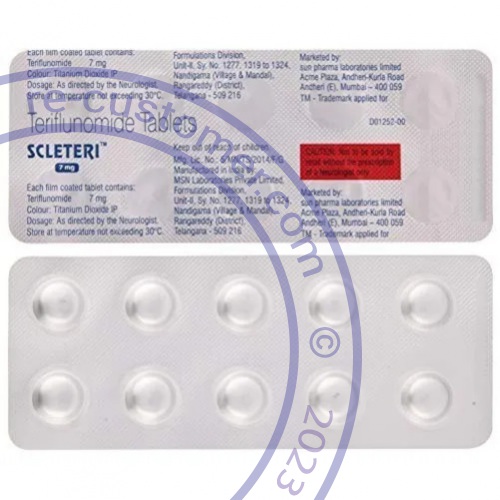
Brand(s): Sceteri
Manufacturer: Sun Pharma Laboratories Limited
Disease(s): Multiple Sclerosis / Clinically Isolated Syndrome / Relapsing-remitting Disease / Active Secondary Progressive Disease
| Package | Price | Per tablet | Savings | Order |
|---|---|---|---|---|
| 14mg × 90 tablets | $ 629.95 | $ 7.00 | $ 269.90 | Add to cart |
| Free AirMail shipping | ||||
| 14mg × 60 tablets | $ 479.95 | $ 8.00 | $ 119.95 | Add to cart |
| Free AirMail shipping | ||||
| 14mg × 30 tablets | $ 299.95 | $ 10.00 | Add to cart | |
| Free AirMail shipping | ||||
Aubagio tablet
What is this product?
Teriflunomide is used to treat relapsing forms of multiple sclerosis in adults (including clinically isolated syndrome, relapsing-remitting disease, and active secondary progressive disease).
Teriflunomide may also be used for purposes not listed in this medication guide.
Warnings
Do not use teriflunomide if you are pregnant or may become pregnant. You will need to have a negative pregnancy test before starting this treatment.
Teriflunomide can cause serious liver problems that may result in the need for a liver transplant. Your liver function will need to be tested before and during treatment with teriflunomide. Tell your doctor if you have a history of liver disease.
Call your doctor at once if you have signs of liver problems: upper stomach pain, loss of appetite, dark urine, or jaundice (yellowing of the skin or eyes).
Before taking this medicine
You should not use teriflunomide if you are allergic to teriflunomide or leflunomide, or if:
• you have severe liver disease; or
• you are also taking leflunomide (Arava).
Do not use teriflunomide if you are pregnant or may become pregnant You will need to have a negative pregnancy test before starting this treatment. Avoid getting pregnant until after you stop taking teriflunomide and undergo a "drug elimination" procedure to help rid your body of this medicine. Stop taking teriflunomide and call your doctor right away if you miss a period or think you might be pregnant.
Tell your doctor if you have ever had:
• liver or kidney disease;
• a fever, or uncontrolled infections;
• numbness or tingling that is unlike your usual MS symptoms;
• serious skin problems when taking medicines;
• diabetes;
• high blood pressure;
• tuberculosis; or
• breathing problems.
Use birth control to prevent pregnancy while you are taking this medicine. After you stop taking teriflunomide, continue using birth control until you have received blood tests to make sure the drug has been eliminated from your body.
If you become pregnant while taking teriflunomide or within 2 years after you stop, your name may be listed on a pregnancy registry. This is to track the outcome of the pregnancy and to evaluate any effects of teriflunomide on the baby.
If you are a man, use effective birth control to prevent pregnancy if your sex partner is able to get pregnant. After your treatment ends, keep using birth control until you have received the medications to help your body eliminate teriflunomide.
You should not breastfeed while using this medicine.
How should I take teriflunomide?
Before you start treatment with teriflunomide, your doctor may perform tests to make sure you do not have tuberculosis or other infections.
Follow all directions on your prescription label and read all medication guides or instruction sheets. Your doctor may occasionally change your dose. Use the medicine exactly as directed.
You may take teriflunomide with or without food.
Teriflunomide can cause serious liver problems that may result in the need for a liver transplant. Your doctor will need to test your liver function up to 6 months before you start taking teriflunomide, and then every month when you first start taking this medicine. Your teriflunomide treatment may be delayed or discontinued based on the results.
Your blood pressure may also need to be checked often.
After you stop taking teriflunomide, you may need to be treated with other medicines to help your body eliminate teriflunomide quickly. If you do not undergo this drug elimination procedure, teriflunomide could stay in your body for up to 2 years. Follow your doctor's instructions.
You will also need to go through this drug elimination procedure if you plan to become pregnant after you stop taking teriflunomide.
Store at room temperature away from moisture and heat.
What happens if I miss a dose?
Take the medicine as soon as you can, but skip the missed dose if it is almost time for your next dose. Do not take two doses at one time.
What happens if I overdose?
Seek emergency medical attention or call the Poison Help line at 1-800-222-1222.
What should I avoid while taking teriflunomide?
Avoid being near people who have colds, the flu, or other contagious illnesses. Contact your doctor at once if you develop signs of infection.
Do not receive a "live" vaccine while using teriflunomide, and for at least 6 months after you stop taking it. The vaccine may not work as well during this time, and may not fully protect you from disease. Live vaccines include measles, mumps, rubella (MMR), rotavirus, typhoid, yellow fever, varicella (chickenpox), zoster (shingles), and nasal flu (influenza) vaccine.
Teriflunomide side effects
Get emergency medical help if you have signs of an allergic reaction (hives, difficult breathing, swelling in your face or throat) or a severe skin reaction (fever, sore throat, burning eyes, skin pain, red or purple skin rash with blistering and peeling).
Seek medical treatment if you have a serious drug reaction that can affect many parts of your body. Symptoms may include: skin rash, fever, swollen glands, muscle aches, severe weakness, unusual bruising, or yellowing of your skin or eyes.
Teriflunomide may cause serious side effects. Stop using teriflunomide and call your doctor at once if you have:
• numbness or tingling in your hands or feet that feels different from your MS symptoms;
• trouble breathing, new or worsening cough with or without fever;
• easy bruising, unusual bleeding, purple or red spots under your skin;
• pancreatitis--severe pain in your upper stomach spreading to your back, nausea and vomiting;
• signs of infection--fever, chills, body aches, nausea, vomiting, feeling tired; or
• liver problems--upper stomach pain, loss of appetite, dark urine, jaundice (yellowing of the skin or eyes).
Common side effects of teriflunomide may include:
• headache;
• nausea, diarrhea;
• thinning hair; or
• abnormal liver function tests.
What other drugs will affect teriflunomide?
Sometimes it is not safe to use certain medications at the same time. Some drugs can affect your blood levels of other drugs you take, which may increase side effects or make the medications less effective. Your doctor may need to adjust the doses of any other medicines you take on a regular basis.
Teriflunomide can harm your liver, especially if you also use certain medicines for infections, tuberculosis, birth control, hormone replacement, high cholesterol, heart problems, high blood pressure, seizures, pain, or arthritis (including Tylenol, Advil, Motrin, or Aleve).
Tell your doctor if you take medicines that may increase your risk of getting an infection, such as cancer medicine of medicines that affect your immune system.
Many drugs can affect teriflunomide. This includes prescription and over-the-counter medicines, vitamins, and herbal products. Not all possible interactions are listed here. Tell your doctor about all your current medicines and any medicine you start or stop using.

Can i help you?



